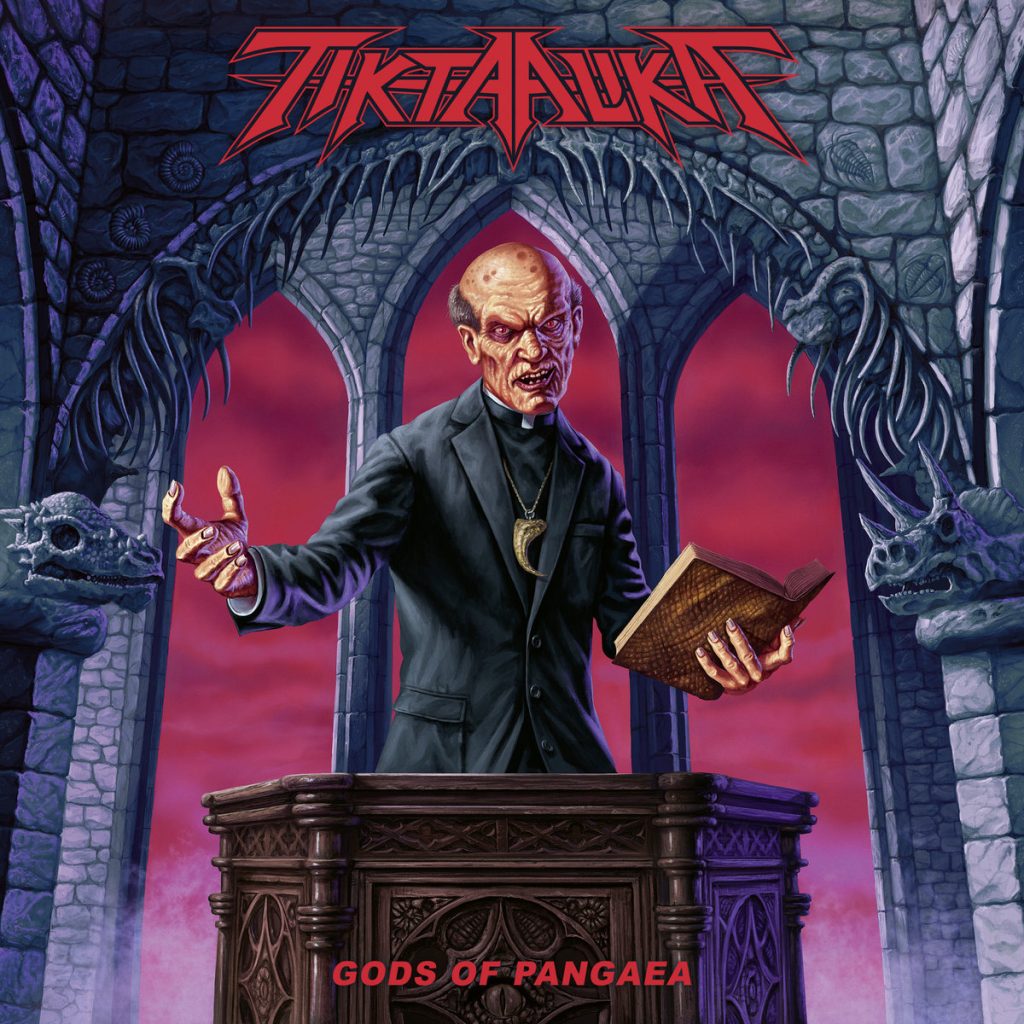Tiktaalika (Charlie Griffiths): ‘Gods of Pangaea’ Review

The concept of “Eras” perennially finds itself at risk of being overused within the music world, with nary a soul immune to mentioning which “Era” they are in regarding shifts in overall tone, musical presentation, or marketing strategy. What happens then, when the “Era” at play represents an actual shift from one geological period to another? Lucky for us, Gods of Pangaea from Tiktaalika has moved metal fans one step closer to that improbable answer (spoiler alert: it’s more than just “massive riffs and dinosaurs,” tempting as that may be).
The second solo album from Charlie Griffiths of Haken fame, Gods of Pangaea sees the guitarist and songwriter trading in his name for the Tiktaalika moniker, as the album itself represents a tectonic shift towards a more riff-forward presentation. Aptly described in promotional material as a “tribute to the art of the riff,” the album opens with a sonic punch in the face and continues that pace throughout its duration, only abated by the occasional slip into a less-aggressive number to let the listener catch their breath. Then, just when the land-fish think it’s safe to go back into the water, Charlie delivers yet another sucker-punch that sounds more at home on early-nineties thrash than on anything that might even remotely share billing with Haken. And speaking of sound–many kudos to Nolly Getgood and Tony Lindgren for mixing an album with so much tightness and sizzle, and to Charlie himself for dialing in one perfect guitar tone after another.
Thematically, the album also represents a literal step forward in terms of chronology. Whereas 2022’s self-titled album referenced the Paleozoic era and the first forms of what would become complex land-based life, the motifs surrounding Gods of Pangea deal with the subsequent Mesozoic Era, with particular attention paid to the mass extinction event at the end of the Cretaceous Period. Because what is more metal than a giant meteor and a mass extinction event?
Apart from needing to consult geology Wikipedia far more often than any album should require, my first listen to Gods of Pangea felt like a rose-tinted trip back to the early 2000s. Starting with Tyrannicide, I was blown back in my seat by tight palm muted rhythm, muted harmonics, and expert, tight drum-work courtesy of Darby Todd. Just short of making me grab my old denim jacket and bullet belt out of the closet, this opener was a fast and punishing first tune, albeit one that would quickly become overbearing if every song was just as over-the-top.
As the album continued into the subsequent track (and first single from the album), Gods of Pangea, a trend of varied pacing and push towards melody started to emerge. A driving, mid-tempo number with big harmonized leads and galloping riffs gave ample new wave of British heavy metal energy, while vocals (courtesy of Danïel De Jongh) landed somewhere in between the sneer of Dave Mustaine and the harmonized vocal leads of M. Shadows.
Truth be told, this album revisits the DNA of countless riffs and passages across such a breadth of classic metal that it would quickly become exhausting if it weren’t assembled with expert care and eye for detail. Every passage feels both at once familiar, yet refreshingly new. Like your favourite childhood brand of crisp in an exciting new flavour, Charlie manages to avoid creating pure nostalgia-bait by combining and melding concepts of thrash, groove, and modern progressive metal into something that has its roots planted firmly in the bedrock of 80s and 90s riffage, with an injection of modern sophistication and nuance in arrangement and technique.
Moving into the middle, we hit my favourite tracks on the album, with Daniel De Jongh tapping out in favor of Vladimir Lalić on vocal duties. Punishing harshes mixed with soaring and vibrato-laden leads, Vladimir brings gorgeous melodies that create infinitely singable hooks across Mesozoic Mantras especially. Starting off as a slow and contemplative ballad, it eventually heats up into a scorching double-time anthem with the aforementioned hooks and dueling solos that set everything off in glorious fashion.
By the time we get to Fault Lines, the musical lineage opens up even further in numerous new directions. Perhaps it’s because the rest of the album has featured only two vocalists up to this point, or maybe for other reasons, but Charlie keeps us on our toes with yet another curveball. That said, the track leaves me torn–I adore Rody Walker’s vocal range and delivery on the track, but everything I hear from him tends to sound like Protest the Hero simply because his voice is so damn unique and special in its own way–and this time is no exception. This isn’t a complaint, but an observation that some may find themselves making subconsciously while listening.
Unfortunately for me, the album tends to lose its pace right at the climactic point. Give Up the Ghost follows as a reprise of the thrash-forward formula, while Lost Continent seems out of place if only for Thomas Giles’ vocals on the track. Another veteran from Charlie’s 2022 debut, Thomas brings his trademark vocal style to this nine-minute epic and offers up a performance that matches the sense of impending doom of the lyrics, but ultimately feels very disjointed in execution. Perhaps that execution represents the sense of devastation and chaos brought about by the Mesozoic extinction event, but for me it represents a slight speedbump on this otherwise tightly cohesive album. Call me a hater, but I would love to see what the other guest vocalists could have done with the otherwise excellent arrangement.
Still, despite not quite sticking the ending for me, Gods of Pangea stands out as an album that sounds completely fresh, even if it does so by returning to those foundational riffs and melodies in the process. Be it Paleozoic, Mesozoic, or beyond, it’s safe to say that this album does not represent Tiktaalika’s flop era in the slightest.









